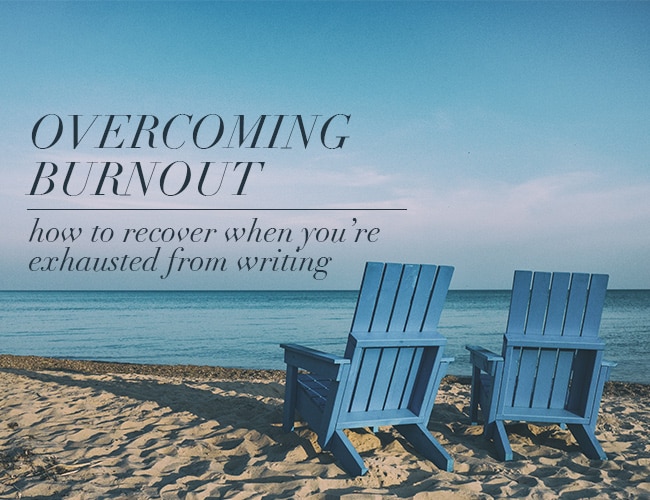Let’s face it: You love to write.
Yet a moment always seems to come when that passion feels more like a prison.

Perhaps it’s due to a crushing deadline. Maybe writing becomes exhausting because the words just don’t come. Maybe the readers don’t come either, and you wonder whether writing is even worth it.
It’s so important for writers to know how to rest. To step back from these pressures and find hope. Overcoming burnout — or the early stages of burnout, if you realize you're getting worn down — is vital to your writing and your own well-being.
Overcoming Burnout: How to Rest From Writing
Rest is essential to recovery. And if you ever want to achieve your writing goals, you have to know how to recover when everything feels like it’s falling apart.
Here’s how.
1. Commit to the Recovery
When you’re worn and weary and overcoming burnout, you need boundaries that provide space between you and your stressful project. To get it, make a commitment that is accompanied by physical action.
For example, you might move files around on your computer, tucking the project away from your desktop screen. You might rearrange your workspace, post reminders, or update your calendar. You can also set reminders on your phone.
And, if you’re comfortable with it, share this commitment with a friend or fellow writer. By stating your intention to rest and recover aloud, it’ll provide the small-but-necessary amount of social pressure needed to keep your commitment.
2. Choose the Proper Timeline
When you make your commitment to rest, give it the proper timeline.
This begs the question: what is the proper timeline for overcoming burnout?
That’s up to you. But as a guideline, I recommend observing the following timelines and adjusting based on your needs:
- Short work (poem, short story, blog post): 2–3 days
- Medium-length work (collections of short stories or poems, blog post series): 1–2 weeks
- Novel-length material: 1–2 months
The key is to provide yourself enough time to thoroughly rest and recover for your return to the task at hand. In order to do that, you need to escape from the numerous sources of anxiety that wore you out in the first place.
And this is where the rubber hits the road: These stressors will tempt you, and scare you, into breaking your commitment early.
3. Recover Your Truth
As writers, we live in frequent, if not constant, fear of failure. I recently felt that fear as I was working on a new website that I hope will help students win lots and lots of college scholarships.
Yet despite this awesome calling, I was terrified.
What was I afraid of?
I wasn’t just afraid of failure. I was afraid of what failure would expose. That deep inside the core of my identity, I am a fraud, unworthy of all the joy and freedom that writing provides.
So a few days ago, I took a short break from all my writing. During that break, I journaled and prayed. And I was able to recover my Truth: that I am loved by the Creator of the Universe and that my desire to tell stories (and teach others about storytelling) is driven by a holy passion. I want to serve people with my stories, and I want others to serve with their stories, too.
The purpose of rest isn’t just to sleep more or spend money on an extravagant vacation. The purpose of rest is to give peace to your soul, recharging it for the difficult tasks life has in store.
So as you commit to a period of rest, use that time to journal, read, meditate, and pray. Return to the source of your creative joy, your Truth, and allow it to strip away all the lies, distractions, and fears that hold you back.
4. Allow Healthy Freedom
Two years ago, I forced myself to take a month of rest.
I had been writing, rewriting, and promoting my debut novel for over two years. And as I saw the launch fizzle before my eyes, I was angry and exhausted.
So I committed to take a month to rest.
Yet I didn’t abandon all writing. How could I? I’m a writer!
The idea of rest is to separate ourselves from the aspects of writing that are causing us to grow weary and lose our identity to fear and stress. For me, that negative aspect was promoting the novel.
But as ideas came to me for new projects during the break, I still took notes. When my family traveled to Tennessee on vacation, I sat on a porch rocker and dreamed big about the future of my writing career.
Was I breaking my commitment? Absolutely not! I was fulfilling its truest intent: allowing myself to recover, overcoming burnout. And part of that recovery was to rediscover healthy creativity, writing that didn’t feel like it was enslaving me to sales goals or Amazon reviews.
And when my one month break was over, I returned to the page totally energized and excited about the future.
The Joy of the Return
Perhaps the best part about a break from writing is the triumphant return afterwards.
After the time away, and after the healthy space without anxiety or fear, my mind was overflowing with new ideas and fresh approaches. There are few moments better than looking at an old project in a new way, and seeing a way forward.
Yet that is so difficult to achieve without a healthy break!
Perhaps this is why we often equate anxiety with drowning. Our fears and stresses feel like rising waters that will never recede.
But when we take the courageous step to rest, it’s like choosing to simply get out of the water. “You have no power over me,” we say to the rising tide.
Do you need a break? Do you need to free yourself from expectations that are crushing you?
Perhaps not today. But someday soon you will, and I hope that you bookmark this post and return to it when you feel like your passion has become a prison.
It won’t always be. When you commit to recover, your passion is born anew.
So have the courage to rest. You, and your love of writing, are worth the risk!
Have you ever needed to rest from your writing? What's helped you in overcoming burnout? Let us know in the comments.
PRACTICE
Today, we're going to rest from our greatest writing goals. Put down your work in progress and take fifteen minutes to free write whatever comes to mind. You're not writing to accomplish anything, but simply to rest. Give yourself permission to write complete gibberish. Have fun as you let the words flow onto the page.
When you're done, share your free writing in the comments, so we can all share in the fun, relaxed, messy experience of playing with words with complete freedom. And be sure to comment on your fellow writers' creative expressions, too!







0 Comments
Trackbacks/Pingbacks